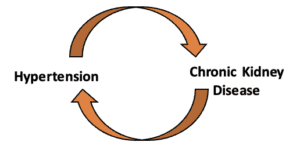High blood pressure and chronic kidney disease (CKD)
Keep track of your kidney data with PKB
Why does Chronic Kidney Disease (CKD) cause high blood pressure? What are the complications? How is it treated? We answer all these questions and more
High blood pressure (also known as hypertension) is a common complication of CKD.
1. Prevalence
Most patients with CKD have high blood pressure. In other words, it is very common.
2. Two-way relationship
CKD usually leads to high blood pressure. High blood pressure causes CKD to get worse faster. This relationship creates a harmful cycle.
Simple mild hypertension does not lead to CKD. Many people with hypertension will not have CKD.
However, ‘accelerated hypertension’ or a ‘hypertensive emergency’ can cause CKD. This is when you have a very high BP (e.g. over 180/120) and are unwell with it (e.g. headache or shortness of breath).

3. Risk factor
Hypertension is a significant risk factor for the development and progression of CKD. This means it may be the cause CKD in some patients and can make CKD worse in patients who already have it.
4. Damage to kidneys
High blood pressure damages the blood vessels in the kidneys. This reduces the kidneys’ ability to remove waste and excess fluids from the blood. This can cause CKD to get worse. Thus controlling blood pressure is crucial in managing CKD.
Click here to learn more about the functions of the kidney.
5. Renin-angiotensin system
The renin-angiotensin system is a mechanism which controls blood pressure and the amount of fluid (e.g. water) in the body. In CKD patients, this system is often overactive. This causes high blood pressure.
6. Complications
Uncontrolled high blood pressure in CKD can lead to serious complications such as heart failure and stroke. It also causes CKD to get worse which may cause kidney failure.
7. Target blood pressure
Patients with CKD are advised to maintain a lower target blood pressure than people without CKD. This usually means aiming for blood pressure readings consistently below 130/80 mm Hg.
If you have diabetes you may be advised to aim for readings under 120/70. This is because diabetes can also worsen CKD. Click here to learn more about diabetes and CKD.
8. Medication
Blood pressure medications are used to treat hypertension in CKD.
Commonly prescribed medications include:
- ACE inhibitors (e.g. Ramipril)
- Angiotensin II receptor blockers (ARBs; e.g. Losartan)
- SGLT2 inhibitors (e.g Dapagliflozin).
As well as reducing blood pressure, these medications help to protect the kidneys. Ideally, many patients with CKD should be on an ACE (or ARB) and an SGLT2 inhibitor.
9. Lifestyle changes
A number of lifestyle changes can help reduce blood pressure. These include:
- A low-salt diet
- Regular exercise
- Weight management
- Limited alcohol intake.
Making these changes may slow the progression of CKD. Click here to learn more about changes you can make.
10. Regular monitoring
Patients with CKD and hypertension should have their blood pressure monitored regularly by:
- Their GP (or practice nurse)
- Nephrologist (specialist kidney doctor)
- (Most importantly) .. themselves.
Summary
We have discussed high blood pressure and chronic kidney disease (CKD). We hope it has been helpful.
Taking your blood pressure
This is how to take your own blood pressure
A firm called A&D make good cheapish blood pressure machines that are easy to use on your own.
If you have CKD, your blood pressure should be measured weekly until it is under 130/80 all the time. Afterwards it can be measured every month, to three months.
Last Reviewed on 17 June 2024
